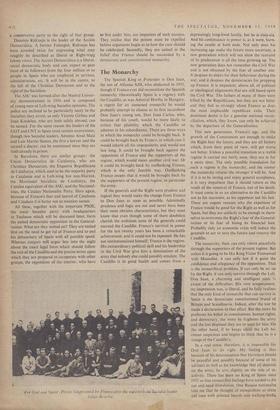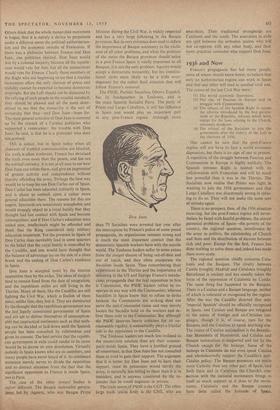The Monarchy
The Spanish King or Pretender is Don Juan, the son of Alfonso XIII, who abdicated in 1931, though if Franco ever did reconstitute the Spanish monarchy (theoretically Spain is a regency with the Caudillo, as was Admiral Horthy in Hungary, a regent for an unnamed monarch) he would probably attempt to choose as its first incumbent Don Juan's young son, Don Juan Carlos, who, because of his youth, would be more likely to evince that pliability which the Caudillo so admires in his subordinates. There are three ways in which the monarchy could be brought back. It could be brought back by Franco, in which case it would inherit all his unpopularity and would not last long. It could be brought back against the opposition of Franco and the supporters of the regime, which would mean another civil war. Or it could be brought back by outflanking Franco, which is the only feasible way. Outflanking Franco means that it would be brought back by the supporters of the present regime, in particular the army.
If the generals and the Right were prudent and logical they would make the change from Franco to Don Juan as soon as possible. Admittedly prudence and logic are not and never have been their most obvious characteristics, but they must know that even though some of them doubtless cherish the ambition none of the generals could succeed the Caudillo. Franco's survival in power for the last twenty years has been a remarkable achievement, and it could not be repeated. He has not institutionalised himself; Franco is the regime. His extraordinary political skill and his leadership in the Civil War give him a domination of the army that nobody else could possibly emulate. The Caudillo is in good health and comes from a
'For God and Spain': Priois (intffiAotted by Franco after the war) with the Sucialit leader
depressingly long-lived family, but he is sixty-six. And his continuance in power is, as it were, burn- ing the candle at both ends. Not only does his increasing age make the future more uncertain, a new generation which will not show the restraint of its predecessor is all the time growing up. The new generation does not remember the Civil War and is not obsessed by the fear of another one. It despises its elders for their behaviour during the war, and it despises the democracies for propping up Franco. It is impatient, above all, of political or ideological alignments that are still based upon the Civil War. The fathers of many of them were killed by the Republicans, but they are not bitter and they feel as strongly about Fr.anco as does the most implacable republican exile. Their dominant desire is' for a genuine national recon- ciliation, which, they know, can only be achieved by the departure of the Generalissimo.
This new generation, Franco's age, and the growth of the Communists are enough to make the Right fear the future, and they are all factors which, from their point of view, will get worse not better. Unless a peaceful transition to a stable regime is carried out fairly soon, they are in for a nasty time. The only possible foundation for -such a regime is the monarchy, and the sooner the monarchy returns the stronger it will be. And if it is to be strong and enjoy general acceptance, it is very important that it should return as the result of the removal of Franco, not of his death. It must come in as an alternative to the Caudillo not as his successor, as his opponent not his heir. These are cogent reasons why the expulsion of Franco would be good for the Right as well as for Spain, but they are unlikely to be enough in them- selves to overcome the Right's fear of the General- issimo or its fear of losing its financial loot. Probably only an economic crisis will induce the generals to act to save the future and remove the Caudillo.
The monarchy, then, can only return peacefully through the supporters of the present regime. But unless'it is going to be like King Victor Emmanuel with Mussolini, it can only last if it gains the confidence and allegiance of the opposition. That is the monarchical problem. It can only be set up by the Right, it can only survive through the Left. Don Juan, a charming and intelligent man. is aware of the difficulties. His own temperament, my impression was, is liberal, and he fully realises that the only kind of monarchy that can survive in Spain is the democratic constitutional brand of Britain and Scandinavia. Indeed, after the war he made a declaration to that effect. But the more he professes his belief in constitutions, human rights, and democracy. the more he frightens the army and the less disposed they are to send for him. On the other hand, if he keeps silent the Left be- comes suspicious and begins to think that he is a stooge of the Caudillo's.
In a real sense, therefore, it is impossible for Don Juan to clO right. My feeling is that because of his determination that his return should be peaceful and possibly because of some of his advisers as well as his knowledge that all depends on the army, he errs slightly on the side of in- activity. There has been no King of Spain since 1931 so that monarchist feelings have tended to die out and need stimulation. One Basque nationalist told me that he thought of monarchists as crazy old men with pointed beards and walking-sticks. Others think that the whole monarchist movement is bogus, that it is merely a device to perpetuate under a different name the political authoritarian- ism and the economic swindle of Francoism. If there was a plebiscite between Franco and Don Juan, one politician insisted, Don Juan would win by a colossal majority because all the republi- cans would vote for him, but all the monarchists would vote for Franco. Clearly those members of the Right who are beginning to sec that a royalist restoration offers the only chances of peace and stability cannot be expected to become democrats overnight. But the Left should not be dismayed by the rallying of such people to the royalist standard; they should be pleased and all the more deter- mined to see that the monarchy is the sort of monarchy that they—and Don Juan—hope for. The most general criticism of Don Juan is summed up by the remark of a Catalan politician who supported a restoration : the trouble with Don Juan, he said, is that he is a pretender who does not pretend.
This is unfair, but in Spain today when all channels of truthful communication are blocked, the truth is often irrelevant. Franco has devalued the truth even more than the peseta, and lies are the normal currency. It is not at all easy to see how Don Juan can refute them, and give an impression' of greater activity and independence without thereby offending the army. Perhaps the best way would be to keep his son Don Carlos out of Spain. Don Carlos has been educated militarily in Spain, and is about to embark upon a rather more general education there. The reasons for this are cogent. Spaniards are notoriously xenophobic and would strongly object to a royal family that they thought had lost contact with Spain and become cosmopolitan; and if Don Carlos's education were ended now, intellectuals might be offended and think that the King considered only military education important. Yet the presence in Spain of Don Carlos does inevitably lead in some quarters to the belief that the royal family is controlled by the Caudillo, and one would have thought that the balance of advantage lay on the side of a clean break and the ending of Don Carlos's residence in Spain.
Don Juan is accepted more by the interior opposition than by the exiles. The ideas of emigres tend to remain fixed from the date of emigration, and the republican exiles are still living in the Thirties. Many of them, like the Caudillo, are still fighting the Civil War, which is foolish of them since, unlike him, they lost it. They are dominated by the thought that the republican government was the last legally constituted government of Spain and are apt to deliver themselves of unexception- able but impractical sentiments such as that noth- ing can be decided or laid down until the Spanish people has been consulted by referendum and given its consent. The best service that the republi- can government in exile could render to its cause would be to decree its own dissolution. Virtually nobody in Spain knows who are its members, and many people have never heard of it. Its continued existence merely serves to divide the opposition and to distract attention from the fact that the significant opposition to Franco is inside Spain, not in Paris.
The case of the other emigre bodies is rather different. The Basque nationalist govern- ment led by Aguirre, who was Basque Prime Minister during the Civil War, is widely respected and has a very large following in the Basque provinces. But its very existence does tend to inflate the importance of Basque autonomy to the exclu- sion of all other problems, and while the problem of the status the Basque provinces should enjoy in a post-Franco Spain is vitally important to all Basques, it is not the only problem. Aguirre would accept a democratic monarchy, but his constitu- tional views seem likely to be a trifle over- dogmatic for the rather fluid situation that will follow Franco's removal.
The PSOE, Partido Socialista Obrero Espafiol, has its headquarters in Toulouse, and is the main Spanish Socialist Party. The party of Prieto and Largo Caballero, it still has influence in Spain and would play an important part in any post-Franco regime. Although more
Don Juan.
than 75 Socialists were arrested last year after the interception by Franco's police of some postal propaganda, its organisation remains strong and is much the most important contact that the democratic Spanish workers have with the outside world. The Toulouse leaders suffer to some extent from the emigre disease of being out-of-date and out of touch, and they often exasperate the Socialists inside Spain. Thus remembering their experiences in the Thirties and the importance of defeating in the US and Europe Franco's menda- cious propaganda that the real opposition to him is Communist, the PSOE leaders refuse to co- operate in any way with the Communists; whereas Socialists in Spain know that to refuse to strike because the Communists are striking does not serve the anti-Communist cause and may merely loosen the Socialist hold on the workers and de- liver them over to the Communists. But although the PSOE deserves heavy criticism for its un- reasonable rigidity, it undoubtedly plays a fruitful role in the opposition to the Caudillo.
The Toulouse leaders are much less inclined to the monarchist solution than are their counter- parts inside Spain. They have a justified ground of resentment, in that Don Juan has not consulted them or tried to gain their support: The argument that it is better for Don Juan not to have their support, since its possession would terrify the army, is naturally less telling to them than it is to outsiders, and is anyway countered by the re- joinder that he could negotiate in private.
The trade union of PSOE is the UGT. The other large trade union body is the CNT, who are anarchists. Their traditional strongholds are Catalonia and the south. The anarchists in exile are split•between the orthodox zealots who will not co-operate with any other body, and their more practical comrades who support Don Juan.











































 Previous page
Previous page